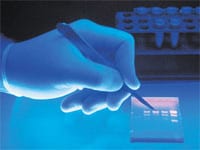News
Stern Featured on MicrobeWorld Radio Program
 A long time ago, in a land of primordial goo, two bacteria lent new meaning to the word “teamwork.” It didn’t start out that way, most scientists think: One bacterium probably ate the other. But it turned out that the two survived better together than they had independently, and their progeny evolved into a single, more sophisticated organism. This process happened at least twice, yielding the specialized cellular compartments mitochondria.
A long time ago, in a land of primordial goo, two bacteria lent new meaning to the word “teamwork.” It didn’t start out that way, most scientists think: One bacterium probably ate the other. But it turned out that the two survived better together than they had independently, and their progeny evolved into a single, more sophisticated organism. This process happened at least twice, yielding the specialized cellular compartments mitochondria.
David Stern’s lab studies chloroplasts, light-harvesting factories unique to plants and algae. While structures called nuclei contain most genes in plant cells, chloroplasts hold a few of their own. Most of these genes have to do with harnessing energy from sunlight to make sugars, a process agricultural scientists hope can be made more efficient through genetic engineering. But since the nucleus controls how the chloroplast’s genes operate, understanding their interaction–the theme of Stern’s research–is essential.
In one project, the Stern lab used a mutant single-celled algae to find how chloroplast gene activity decreases when cells are starved of sulfur. The mutation occurred in a gene in the nucleus that scaled down copying of DNA to RNA under low-sulfur conditions. By comparing the mutant with normal algae, lab members found that the protein affected gene copying not only in the nucleus (as previously thought), but also in the chloroplast. Since plants need sulfur-containing proteins to process light energy and avoid its potentially harmful effects, this system may protect a sulfur-starved cell by cutting how much light it absorbs.
This mechanism is just one step in the delicate choreography between nuclei, chloroplasts, and the environment. Future experiments on their relationship will add a novel chapter to our understanding of evolution–one that explains how three organisms became one.
Audio (Spot) (MP3 audio; 2.3 MB)

